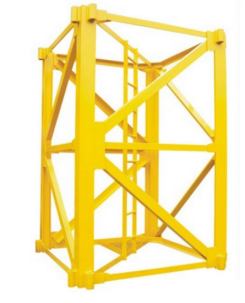Tower Crane Components: Structure and Function

Tower Crane Components: Structure and Function
A tower crane is composed of various components, including foundational parts such as the tower and base, working mechanisms like the hoisting, luffing, and slewing mechanisms, and safety devices like the load moment limiter and load limit switch. These components work together to ensure the stable operation and safety of the tower crane.
As a crucial piece of construction equipment, tower cranes have complex components with diverse functions. This article will introduce these components one by one, helping readers better understand their roles and significance.
I. Foundational Components
1. Tower: The main structure of the tower crane, bearing the weight of the entire machine and various loads. Towers are typically assembled from standard sections for easy transportation and installation.
2. Base: The foundation of the tower crane, ensuring the stability of the entire machine. The base design should consider geological conditions, wind forces, and other factors to guarantee the safe operation of the crane.
II. Working Mechanisms
1. Hoisting Mechanism: Responsible for the vertical movement of the crane, primarily consisting of an electric motor, reducer, drum, and steel rope. The performance of the hoisting mechanism directly affects the lifting capacity and working efficiency of the crane.
2. Luffing Mechanism: Used to adjust the elevation angle and radius of the crane boom to meet the needs of different working heights. Luffing mechanisms are typically driven by hydraulic cylinders or steel ropes.
3. Slewing Mechanism: Allows the crane boom to rotate horizontally, enabling all-round operations. The slewing mechanism generally consists of a slewing bearing and a drive unit.
III. Safety Devices
1. Load Moment Limiter: Prevents the tower crane from overloading and tipping over. When the load moment exceeds a preset value, it will automatically cut off the power to the hoisting or luffing mechanism.
2. Load Limit Switch: Limits the lifting capacity of the crane to prevent overloading. When the load reaches the preset value, it will sound an alarm and cut off the power to the hoisting mechanism.
In addition to the components mentioned above, tower cranes also include electrical systems, lubrication systems, and other parts. These components work together to ensure the stable operation and safety of the tower crane.
In conclusion, each component of a tower crane plays a vital role. Understanding the composition and function of these components helps us better use and maintain tower cranes, ensuring their safe and efficient completion of various tasks.
- Art
- Causes
- Crafts
- Dance
- Drinks
- Film
- Fitness
- Food
- Spellen
- Gardening
- Health
- Home
- Literature
- Music
- Networking
- Other
- Party
- Religion
- Shopping
- Sports
- Theater
- Wellness


